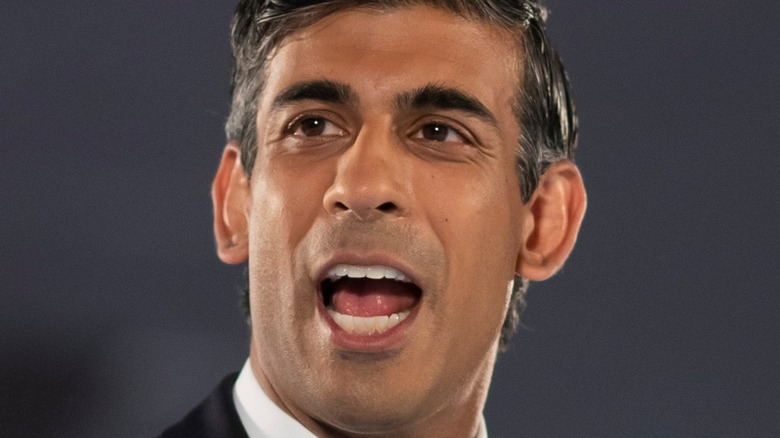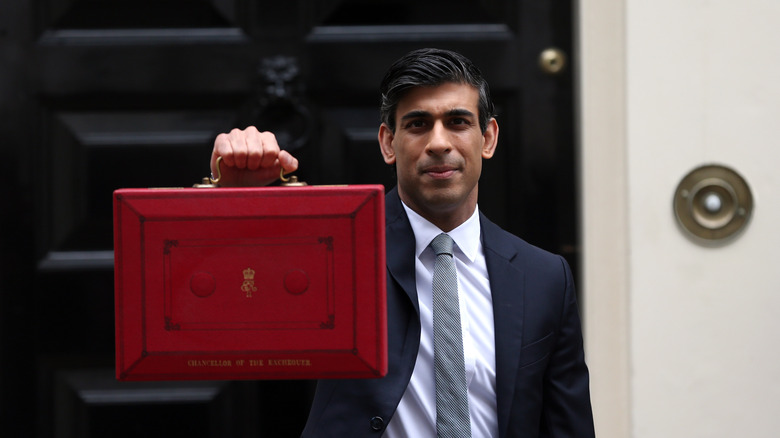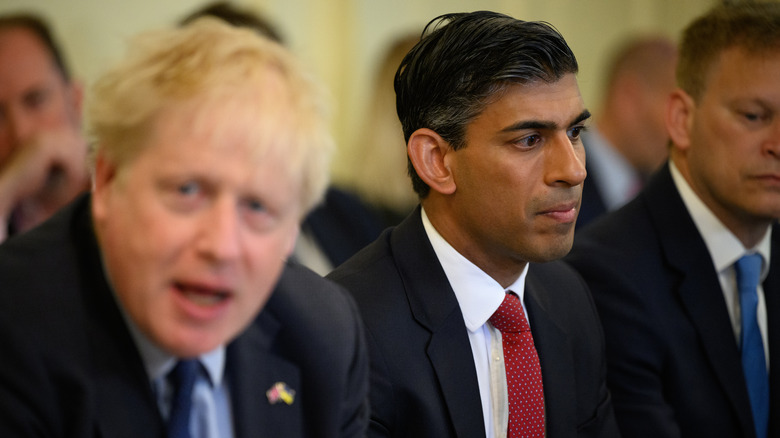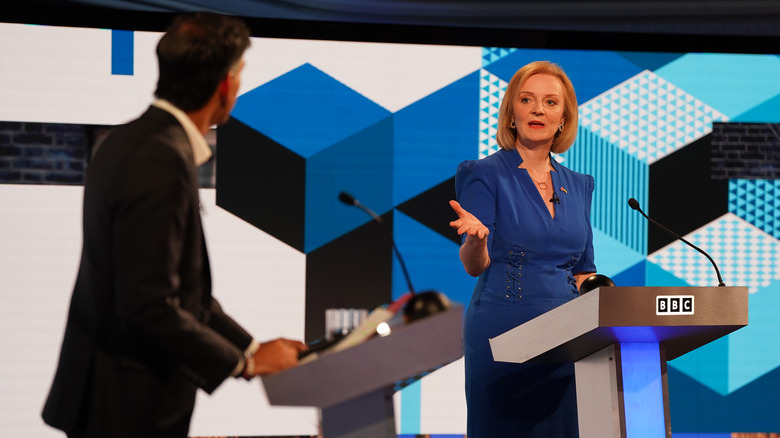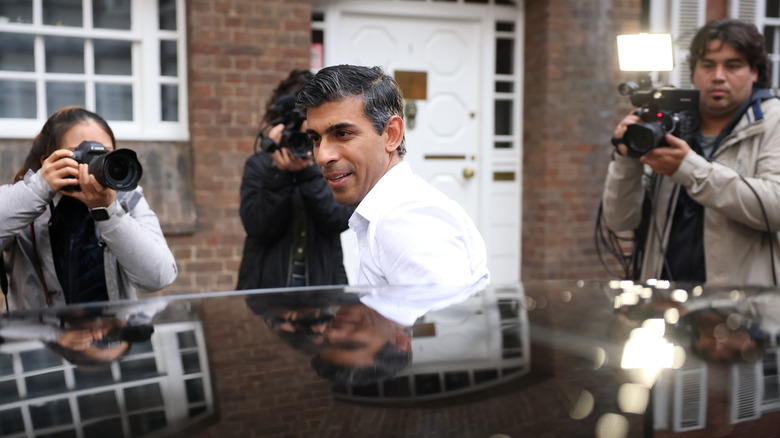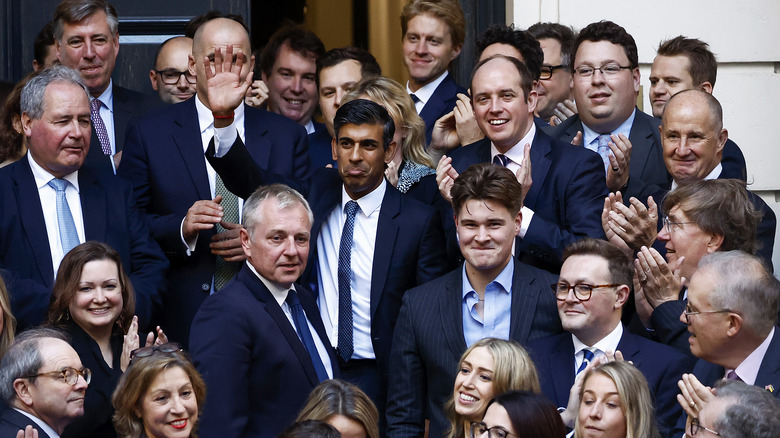How Rishi Sunak Became Prime Minister Of The UK
On Monday, October 24, 2022, Rishi Sunak, the former British Chancellor of the Exchequer, officially became leader of the Conservative Party, taking over from his embattled predecessor, Liz Truss, who resigned from the role just four days earlier. And by becoming leader of the party — the largest in the British House of Commons — Sunak also inherits the biggest job in the land: that of Prime Minister of the United Kingdom of Great Britain and Northern Ireland.
Sunak's victory in the Tory leadership race is a historic one, as noted by former leader David Cameron, who tweeted: "Huge congratulations @RishiSunak on becoming PM to lead us through challenging times. I predicted a decade ago that @Conservatives would select our first Brit Indian PM & proud today that comes to be." Similarly, British journalist Lewis Goodall notes that Sunak is one of the youngest democratic leaders in British history. At 42, he is the youngest prime minister since Lord Liverpool, who served until 1827 (via Britannica).
But how did Sunak — who is one of the richest people in Britain (via The Washington Post) and who was first elected as a member of parliament (MP) as recently as 2015 (via the BBC) — get here? Here is a recap of his recent political career and his arduous climb to the top of British politics.
Sunak in the cabinet
Rishi Sunak's first steps into frontline politics began in 2019 under newly-installed Prime Minister Boris Johnson. Like Johnson, Sunak had campaigned for the United Kingdom to exit the European Union during the Brexit Referendum campaign of 2016 and remained true to the cause, voting alongside former Prime Minister Theresa May for a series of withdrawal agreements (via The Hindu), all of which ultimately failed and led to her resignation (per NPR). Sunak then became a supporter of Johnson and, upon Johnson's leadership victory, was rewarded with his first major role in government: that of Chief Secretary to the Treasury (via the British Government website).
But Sunak's rise didn't stop there. Toward the end of 2019, Johnson called for a general election to try and secure greater parliamentary support, clear his benches of opposition within his own party, and break a parliamentary deadlock scuppering his "hard" Brexit deal (via CNN). After three years of stalling and failing to secure a deal with Europe, the British public went to the polls and delivered a resounding victory for Johnson and the Conservative Party, who gained a working majority of 80 (via the BBC). Flying high in the wake of his victory, Johnson filled his cabinet with loyal supporters, including Sunak, who became Chancellor of the Exchequer in charge of government budgets and the public purse on February 13, 2020.
A divisive turn against Johnson
As noted, Rishi Sunak was always considered loyal to Boris Johnson, and the two worked closely together in the months after the latter led the Conservative Party to a resounding victory in the 2019 general election. However, as Johnson's tenure wore on, the controversial prime minister became embroiled in countless scandals. Perhaps most notable was "Partygate," in which Johnson and his staff were proven to have held countless parties in 10 Downing Street during a period of COVID-19 pandemic lockdown — at the same time that it was illegal for everyday Britons to mix with other households. As The Guardian notes, both Johnson and Sunak were fined by the police for their illegal gatherings.
Johnson's waning premiership finally became untenable after he was found to have promoted a man accused of sexually inappropriate behavior to the role of deputy chief whip (via The Independent), following which Sunak and his cabinet colleague Sajid Javid resigned, citing their loss of confidence in Johnson (via The Guardian). Scores of ministers soon followed Sunak out the door, and Johnson himself was forced to resign days later.
A controversial campaign left Sunak in exile
After Boris Johnson's resignation, Rishi Sunak was one the most prominent Tories vying to replace him over the weeks that followed. Though a total of eight candidates threw their hat into the ring to enter the Tory leadership contest, Sunak's tilt at the top job seemed better organized than most; in fact, several news outlets — including the Johnson-supporting British tabloid the Daily Mail — noted that the URL of Sunak's campaign website, "ready4rishi.com," had been bought as early as December 2021, months before Johnson's position had grown untenable. This suggested that Sunak had been involved in an orchestrated plan to undermine and oust the prime minister long before he resigned from his post.
That Sunak had effectively stabbed Johnson in the back marred his reputation with Conservative Party members throughout the leadership contest, which ran for seven weeks from July until September 2022. Through four rounds, Sunak's rivals were voted out until he was faced with a head-to-head battle with Liz Truss, the foreign secretary under Boris Johnson. But though many more MPs supported Sunak than Truss, in a popular vote among party members, Truss was elected Conservative Party leader (via The Guardian). This meant that Sunak, who had given full voice to his belief that Truss would be a disastrous prime minister, had to retreat to the political wilderness while his rival took the hot seat.
Running again and reigniting an old rivalry
Of course, as news outlets around the world reported, Liz Truss' premiership went into almost immediate meltdown. Most notably, a disastrous so-called "mini-budget" spooked the markets and tanked the economy, with government debt increasing as the pound dropped to its lowest value against the dollar in decades (via The Guardian). With support from ambivalent MPs within her own party wavering and high-profile resignations piling up, Truss was forced to resign after just 45 days in office. This meant that the Conservative Party was, for the second time in 2022, looking for a leader who would also become the de facto prime minister of the U.K. However, this time, the contest had to be run on short notice before an emergency budget announcement to reverse the damage of Truss' "mini-budget" that was due to be unveiled by the end of October, just a week and a half after her resignation.
Despite his loss in the summer leadership contest, Sunak's name was one of those first to be mentioned in discussions over who might replace the short-lived Truss as prime minister, though it was one of his summer rivals, Penny Mordaunt, who first declared publicly that she was running for the role, according to The Guardian. Alongside Mordaunt, there were rumors that Boris Johnson — who was on holiday in the Caribbean during the crisis, though parliament was in session — might consider a comeback. The disgraced former prime minister made an emergency return to the U.K. as his supporters continued to canvass for his return, per CBC News.
Sunak takes the crown
Senior Conservatives announced that each nominee would require the support of 100 Tory MPs to go through to the vote, which many believed Boris Johnson was capable of getting. But though Johnson may have been encouraged by the vocal public support he received from many supporters within his party and in the right-wing media—- and though he released a statement claiming to have gained the support of 102 MPs — he officially announced that he was stepping back from the contest on Sunday, October 23, per Euronews. When Penny Mordaunt followed suit the following day, Rishi Sunak was declared winner, having received the backing of over 200 MPs (per The Guardian) without a vote being held (via CNBC).
Though the Conservative Party remains notoriously fractious, Sunak's win has been greeted by messages of support from across the Tory political spectrum — on paper, at least — with messages of support arriving from Theresa May and Liz Truss in the hours after his victory. Following the official announcement of Sunak's victory, the new prime minister met with fellow Tories at Conservative Party HQ, describing the position the Tories found themselves in as one of "existential threat," but also telling the assembled parliamentarians (via The Guardian): "We are going back to serious, pragmatic traditions of Conservative government. The message we heard was about going forward – as a party and a government this about the future and shaping the future. We cannot rewrite history. We will play the hand we have got, but it is not an inevitable threat we face."
